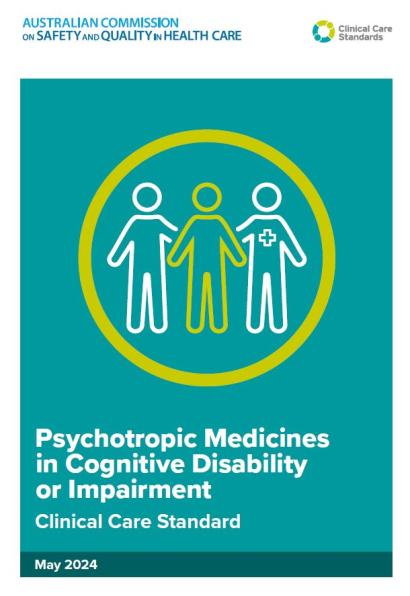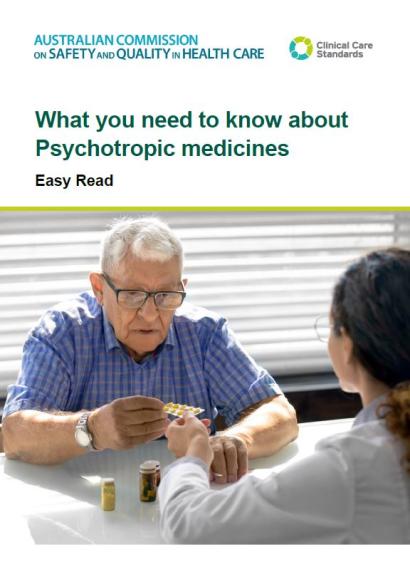Psychotropic Medicines in Cognitive Disability or Impairment Clinical Care Standard
The Psychotropic Medicines in Cognitive Disability or Impairment Clinical Care Standard provides guidance to clinicians, healthcare services and consumers on the safe and appropriate use of psychotropic medicines.
This national standard was released by the Commission on 9 May 2024.
Download the standard
The Psychotropic Medicines in Cognitive Disability or Impairment Clinical Care Standard aims to ensure the safe and appropriate use of psychotropic medicines in people with cognitive disability or impairment.
Launch of the standard
The standard was launched on 9 May 2024. See the expert panel discuss key challenges and best practice including informed consent, assessment, non-medication strategies and follow-up care when medicines are considered necessary.
Watch the launch recording and video highlights below.
Video highlights
Introduction to the standard
A brief overview of the standard.
Assistant Minister for Health and Aged Care
A message from the Hon Ged Kearney, Assistant Minister for Health and Aged Care.
Chair of the Board of the Commission
Official launch of the Standard by Professor Kilpatrick, Chair of the Board of the Australian Commission on Safety and Quality in Health Care.
James's experience
James has an intellectual disability and mental health conditions. James explains how non-medication strategies and psychotropic medicines help him in his day-to-day life.
Bronte's experience
Bronte cared for his wife Glenda after she was diagnosed with a rare form of early onset dementia. Bronte talks about his and Glenda’s experience with psychotropic medicines.
Introduction to the standard
A brief overview of the standard.
Assistant Minister for Health and Aged Care
A message from the Hon Ged Kearney, Assistant Minister for Health and Aged Care.
Chair of the Board of the Commission
Official launch of the Standard by Professor Kilpatrick, Chair of the Board of the Australian Commission on Safety and Quality in Health Care.
James's experience
James has an intellectual disability and mental health conditions. James explains how non-medication strategies and psychotropic medicines help him in his day-to-day life.
Bronte's experience
Bronte cared for his wife Glenda after she was diagnosed with a rare form of early onset dementia. Bronte talks about his and Glenda’s experience with psychotropic medicines.
Contents of the standard and resources
The Psychotropic Medicines in Cognitive Disability or Impairment Clinical Care Standard contains:
- Eight quality statements describing safe and appropriate care
- A set of indicators to support monitoring and quality improvement.
View a complete list of related resources or see targeted information and implementation resources developed for:
Communications resources
Show your support for the clinical care standard by sharing our resources on your website, social networks or within your organisation.
Access our communications kit which includes newsletter copy and social media graphics to help you share and promote the standard.
Background and development of the standard
Contact us
If you have any questions about this clinical care standard, email ccs@safetyandquality.gov.au
For updates on standards due to be launched and out for consultation, follow us on Twitter @ACSQHC or subscribe to our eNewsletters.


